Author Archive
Posted on: November 17th, 2021 by Waterloo Region Crime Prevention Council
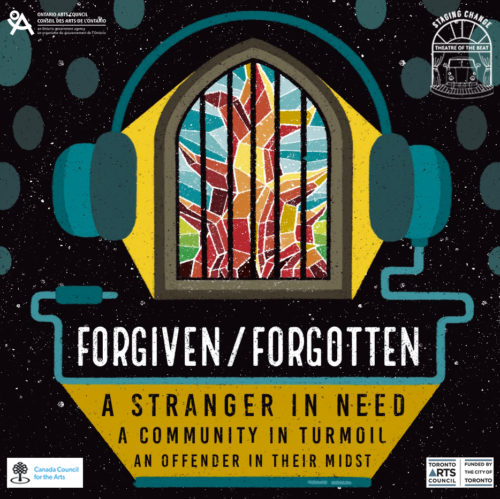
Forgiven/Forgotten
Audio/Visual Drama and Panel
Theatre of the Beat is set to premiere their audio-visual presentation of Forgiven/Forgotten followed by a panel discussion at the Ken Seiling Waterloo Region Museum on November 19th at 7:30PM in recognition of International Restorative Justice Week 2021. Enjoy complimentary popcorn at the Museum from special guest, Comeback Snacks.
The panel, facilitated by Theatre of the Beat, will include people with lived experience of incarceration, their community supports, and the Stride program from Community Justice Initiatives (CJI).
Additional screenings and panels will be held including the Princess Twin Cinema in Waterloo on December 1st and 2nd at 7:30PM. We will also be presenting 3 digital screenings of the productions for folks who would prefer to watch from home on November 26th, 27th, and 28th.
Digital screenings are available to view by donation and live screening tickets are $15. Find the link to purchase tickets, additional show information, and behind-the-scenes photos on the Theatre of the Beat’s website here.
Forgiven/Forgotten follows the varying responses of a community that learns an ex-offender will be serving his parole in their midst. This emotionally driven piece addresses issues of crime, reintegration, and our responses to those affected by these themes most. We are hoping to spread awareness about this issue, as well as enable audience members with resources and approaches for navigating difficult conversations about forgiveness, justice, and community.
Posted on: November 15th, 2021 by Waterloo Region Crime Prevention Council
 Waterloo Region Crime Prevention Council Member Tom Galloway recently joined Mike on The Mike Farwell Show to advance the upstream conversation. You can listen to the conversation by clicking here and jumping ahead to 21:54.
Waterloo Region Crime Prevention Council Member Tom Galloway recently joined Mike on The Mike Farwell Show to advance the upstream conversation. You can listen to the conversation by clicking here and jumping ahead to 21:54.
To read the op-ed Tom and Mike were discussing, please keep reading below. Let us know what you think and share your thoughts by tweeting us @PreventingCrime on Twitter.
The following op-ed was written by Tom Galloway and shared with his permission.
Upstream Thinking
In his book, “Less Law More Order, The Truth About Preventing Crime”, Irvin Waller, the University of Ottawa Criminology Professor and the Founding CEO of the International Centre for Crime Prevention writes in the Introduction:
“So, I have written this book so that intelligent readers will be aware of the truth and good sense that would prevent crime and have their taxes spent more judiciously – pun intended”
Irvin’s book goes on to chronicle case study after case study that conclude empirically that social development activities dealing with root causes and social determinants of health, play a primary role in reducing poor health, and criminal justice outcomes for many among us, particularly racialized and marginalized communities, poor people and those with mental health issues.
I had the good fortune a few years ago to travel to Winnipeg with Professor Waller along with Christiane Sadeler, then the Executive Director of the Waterloo Region Crime Prevention Council(WRCPC) and Chief Bryan Larkin. Our role was to sell the City of Winnipeg on establishing a similar CPC community organization. My conversations with Professor Waller further crystalized my understanding of how “upstream” initiatives (social development) cause much bigger positive social and health outcomes including criminal justice outcomes; initiatives like affordable housing, addictions, youth engagement, parental supports. The positive effects are first and foremost human; better socio-economic and health outcomes and fewer criminal justice interactions. But there is also a financial payoff; research shows that for every dollar spent on social development (upstream) at least 7 dollars is saved in the social, health, and criminal justice systems (downstream). Some say its even greater than 7 dollars.
The conundrum is that saving the 7 dollars is not immediate. Time is required for the social development activity to bear fruit. Unfortunately, in the meantime, the immediate needs of the health, and criminal justice systems suck up all the oxygen and continue to grow exponentially (e.g. Police, Courts, Corrections). We pour more money into fixing people’s health and criminal justice issues and into enforcement activities rather than preventing the issues in the first place. We must find a way to reverse this and find new or redirected funding.
There are some positive signs in our community. First there is clear evidence that more and more people are understanding this upstream/downstream relationship and the dilemma around funding. There is more advocacy and activism than ever before. The evidence has been around for a long time; however, I am heartened by the newly elevated level of community understanding and discourse.
And there is movement in local initiatives towards a more “upstream” approach. As an example, the Waterloo Region Crime Prevention Council is anticipating a new relationship with Community Justice Initiatives to create a “Justice Centre” rooted in upstream and restorative principles.
And Regional Council has directed staff to report back to Council on the manner of having a broad community conversation on a local Upstream philosophy and approach.
And there are other developments as well.
My various involvements in the community have changed and shaped my understanding of how upstream activities can reduce the need for the downstream ones but most importantly will improve human outcomes. We need to continue this process. We will need community and political support. We will need support from senior levels of government. And we will need to measure the outcomes over time.
Tom Galloway
Kitchener
Posted on: November 3rd, 2021 by Waterloo Region Crime Prevention Council
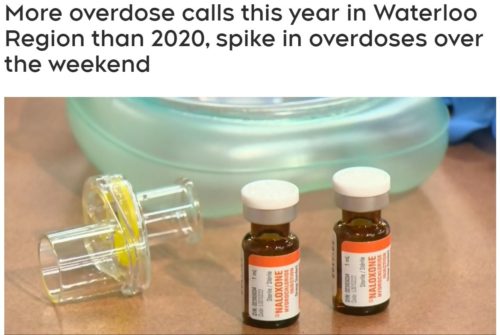 KITCHENER – A warning has been issued by the Waterloo Region Integrated Drugs Strategy (WRIDS) after an increase in overdose calls.
KITCHENER – A warning has been issued by the Waterloo Region Integrated Drugs Strategy (WRIDS) after an increase in overdose calls.
In a press release, the organization said emergency services responded to 21 overdose related calls this weekend, including a suspected overdose death.
Officials add that there have been 1,244 overdose-related calls to emergency services in Waterloo Region so far this year. This number is already higher than the total for all of 2020, which was a five-year high.
“For staff, that means they can’t do the other work that they’re there to do,” said Michael Parkinson with the Waterloo Region Crime Prevention Council. “It really is a medical emergency on a population level.”
The unexpected reactions include extreme drowsiness and lethargy even after naloxone is administered, and benzodiazepines may be in the local drug supply, according to officials.
They warn substances circulating in Waterloo Region may be stronger than expected and contain substances that cause unexpected reactions.
WRIDS is asking those who are using substances to not use alone, and to access the consumption and treatment services site at 150 Duke St. West in Kitchener.
Click here to read the rest of the article.
Posted on: October 5th, 2021 by Waterloo Region Crime Prevention Council
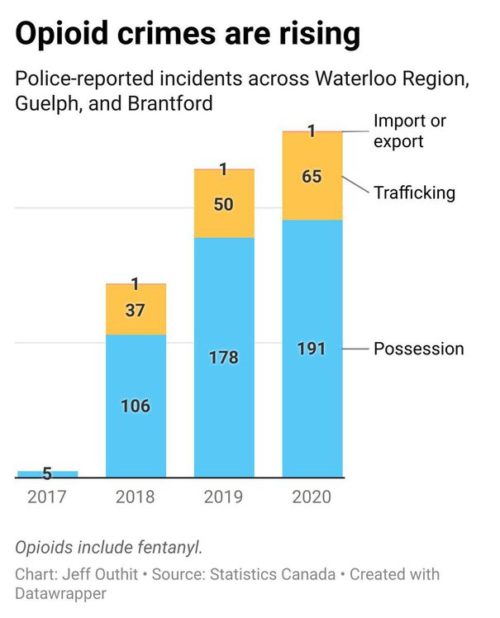
WATERLOO REGION — Crimes for possessing and selling illicit drugs such as fentanyl are surging in this part of Ontario as overdose deaths also rise.
“We’re a bit of a hub for trafficking,” said Michael Parkinson, a drug strategy specialist with a community council that aims to prevent crime in Waterloo Region. “There are a lot of people using unregulated opioids in this area.”
New crime data shows Guelph ranks fourth, Waterloo Region ranks sixth, and Brantford ranks ninth in the nation for opioid-related crime rates in 2020. That’s among 32 large urban areas according to a recent report by Statistics Canada.
Opioid-related overdose deaths rose to 102 in this region in 2020, up from 62 deaths in 2019. Overdose deaths are keeping pace this year with another 66 reported by Sept. 10.
Fentanyl is a synthetic drug prescribed for pain medication that is also made and used illegally. It is far more potent than morphine.
Click here to read the rest of the article.
Posted on: September 9th, 2021 by Waterloo Region Crime Prevention Council
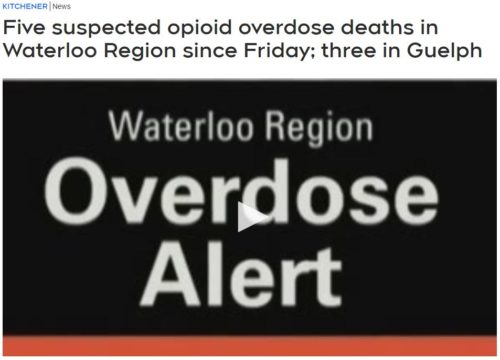 WATERLOO – There have been five suspected opioid overdose deaths in Waterloo Region and three in Guelph since Friday, prompting alerts from public health officials.
WATERLOO – There have been five suspected opioid overdose deaths in Waterloo Region and three in Guelph since Friday, prompting alerts from public health officials.
In Waterloo Region, the Overdose Monitoring and Response System (OMARS) issued an overdose alert warning on Tuesday in the wake of a recent spike in overdose deaths since Sept. 3.
“The unregulated drug supply is inconsistent and dangerous and there is an increased risk of overdose,” reads a statement posted on the Waterloo Region Integrated Drugs Strategy website.
There are no reports of a specific colour of substance circulating, but substances may be stronger than expected or contain other substances that cause unexpected reactions, the overdose alert states.
Click here to keep reading the CTV News Article
Posted on: September 9th, 2021 by Waterloo Region Crime Prevention Council
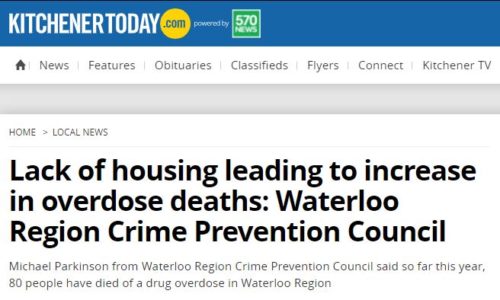 KITCHENER – A lack of stable housing is leading to more and more drug overdose deaths across the region.
KITCHENER – A lack of stable housing is leading to more and more drug overdose deaths across the region.
“We know that across Ontario, approximately one out of six of the opioid-related fatalities were among people who did not have stable housing,” said Michael Parkinson, the Waterloo Region Crime Prevention Council’s drug strategy specialist.
“We know that drug poisoning fatalities disproportionately affect lower income neighbourhoods.”
He said so far this year, 80 people have died of a drug overdose in Waterloo Region. Compare that to the 20 people died in motor vehicle crash across the region last year — and compare it to the SARS epidemic, when 44 people died across Canada in total.
“So what we have not seen is the same kind of urgent and proportional response that we see with other important, but less common forms of death and injury, whether it is motor vehicle collisions or SARS — and the data reflects that. Those trend lines continue to escalate and go the wrong way.”
He said people who lack stable housing are at greatest risk of dying from drug poisoning.
“A gentleman who had passed away from drug poisoning — he wasn’t the only one. In the last five days or so, Waterloo Region, Wellington County and Guelph have lost a total of eight people to accidental poisoning.
“There is no sign that this is going to slow down soon enough for anyone.”
Click here to listen to this article.
Posted on: August 30th, 2021 by Waterloo Region Crime Prevention Council

Urgent social issues. Profound inter-generational economic, social, cultural, and environmental consequences.
The research speaks for itself. The courageous storytellers remind us. We need innovative, collaborative, heart-felt approaches to shift the underlying conditions that hold complex social issues in place. For good.
Click here to read just a few examples of why Condition Shift exists, including WRCPC’s overdose prevention with excerpts from our Focus On: Safe Supply report. What’s your call to action? Do you have a powerful statistic or story to share?
Posted on: August 30th, 2021 by Waterloo Region Crime Prevention Council
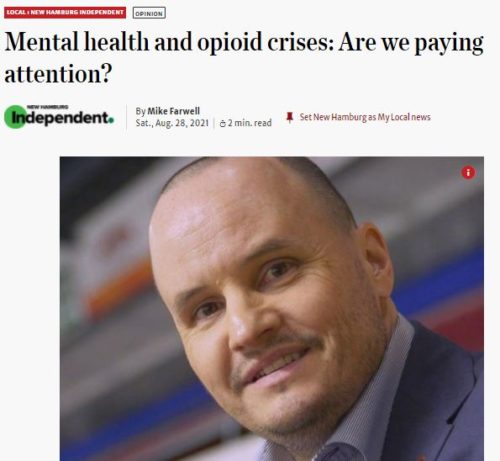 New Hamburg Independent – Eerie similarities are beginning to emerge between our region’s ongoing opioid crisis and the aptly named “parallel pandemic” that has seen an increasing strain on our mental health.
New Hamburg Independent – Eerie similarities are beginning to emerge between our region’s ongoing opioid crisis and the aptly named “parallel pandemic” that has seen an increasing strain on our mental health.
On opioids, we’re too-well aware of the toll, with more than 6,200 overdose deaths reported in Canada last year, or an average of 17 every day. The situation is similarly grim in Waterloo Region, with a record 102 overdose deaths in 2020, almost double the number of the previous year.
If the current numbers continue apace, Waterloo Region will record an almost identical number of overdose deaths again this year.
Add to that a study released earlier this summer by the University of Waterloo, and you see an almost 600 per cent increase in opioid deaths and hospitalizations since the start of this century.
We saw this coming.
In 2008, the Waterloo Region Crime Prevention Council published “A First Portrait of Drug Related Overdoses in Waterloo Region.” The report chronicled annual record rises of opioid deaths in Ontario, fuelled mainly by “bootleg fentanyls,” highly toxic drugs that many people were unaware of ever consuming.
The report advocated for “overdose prevention and intervention programs” that never arrived and, a decade later, fentanyl became a street drug so common that most of us recognized its name and its role in overdose deaths.
Click to finish reading Mental Health and Opioid Crisis: Are We Paying Attention?
Posted on: August 26th, 2021 by Waterloo Region Crime Prevention Council

KITCHENER-WATERLOO – There’s a big question troubling a lot of minds in Waterloo Region these days. What can this community do to stop the steady, frightening rise in local gun crimes?
While there were 15 shootings in the region in all of 2020, there have been no fewer than 13 so far this year — despicable, lawless actions that injured nine people and terrorized entire neighbourhoods.
[…]
But this is far from just an issue for police. Instead of pinning so many of our hopes for staying safe and well on law enforcement and criminal justice officials, we need to start thinking differently. We need to listen to other voices, not just the voices of those wearing a badge. Prevention, not reaction, should become the motto of the day.
This isn’t a call to reinvent the wheel. To a large degree it’s a plea to put in practice solutions that have long been known. For instance, in 2008 the Ontario government commissioned “The Roots of Youth Violence” report, which offered recommendations for preventing crime that didn’t involve the justice system. But “that report went nowhere,” according to Michael Parkinson of the Waterloo Region Crime Prevention Council.
Likewise, Parkinson keenly regrets the demise of the federally funded inReach youth street gang prevention program that operated in Waterloo Region between 2009 and 2013. The program, which among other things offered athletic and educational initiatives to young people at a neighbourhood level, was having a positive impact. But it ended far too early when its funding was cut.
Now Parkinson and other members of the Crime Prevention Council argue this community needs to introduce similar programs that will address the root causes of criminal activity, including poverty, food insecurity, family conflicts, racism and mental health challenges.
We second that call. Such programs would offer a real hope of preventing the kind of gun violence we’ve been witnessing. We need to know who is doing the shooting and why. And because several of this year’s local shootings involved elements of organized crime from many parts of southern Ontario, many municipalities will have to join forces.
Read more…
Posted on: August 17th, 2021 by Waterloo Region Crime Prevention Council
 WATERLOO – In the wake of the Waterloo Region’s 12th shooting this year, one local expert says more needs to be done to prevent further gun violence.
WATERLOO – In the wake of the Waterloo Region’s 12th shooting this year, one local expert says more needs to be done to prevent further gun violence.
“It’s a concerning trend going the wrong way,” said Michael Parkinson with the Waterloo Region Crime Prevention Council. “We need to get off this wheel of always being reactive, shutting down successful programs and keep them going for the long run.”
Parkinson is urging community leaders to change the funding model to better support local programs aimed at crime prevent.
“There’s no substitute for an adequate income, for a good job, for having supports in schools, for having the opportunities in recreation and arts and sports,” he said.
Parkinson’s calls for more supports come as Waterloo regional police continue to investigate a pair of weekend shootings in Waterloo and Kitchener.
Read more…


 Waterloo Region Crime Prevention Council Member Tom Galloway recently joined Mike on The Mike Farwell Show to advance the upstream conversation. You can listen to the conversation by
Waterloo Region Crime Prevention Council Member Tom Galloway recently joined Mike on The Mike Farwell Show to advance the upstream conversation. You can listen to the conversation by  KITCHENER –
KITCHENER –

 KITCHENER – A lack of stable housing is leading to more and more drug overdose deaths across the region.
KITCHENER – A lack of stable housing is leading to more and more drug overdose deaths across the region.
 New Hamburg Independent – Eerie similarities are beginning to emerge between our region’s ongoing opioid crisis and the aptly named “parallel pandemic” that has seen an increasing strain on our mental health.
New Hamburg Independent – Eerie similarities are beginning to emerge between our region’s ongoing opioid crisis and the aptly named “parallel pandemic” that has seen an increasing strain on our mental health.
